高考英语基础语法浓缩版
高考英语语法知识最全概括

5). 以 f 、 fe 结尾的,先把 f 、fe 变 v 再加 es:
leaf----leaves self---selves shelf----shelves life----lives
thief---thieves
2. 少数名词的复数形式是不规则的:
man----men
woman---women child----children
a piece of paper a cup of tea a glass of milk
三、名词的所有格:
1. ’s 所有格:
1). 用 and 连接两个并列的单数名词表示共有关系时,这时只在最后一个名词
后加“’ s. ”:
This is ____________________(Mary and Lily) bedroom.
高考英语语法易考知识点最全概括
第一讲座:名词 --- 基础篇
一、名词的复数:
1. 名词变复数的规则形式:
1). 一般情况下直接加 s: book------books cup-----cups
2). 以辅音字母 +y 结尾的,先变 y 为 i 再加 es :
city-------cities family-----families
tooth----teeth mouse---mice
3. 单数和复数形式相同:
deer---deer fish----fish sheep----sheep Chinese
----Chinese Japanese---Japanese
4. 某国人的复数:
hero-----heroes foot-----feet
hairs “几根白发”; glass “玻璃”, a glass “一只玻璃杯”。
超实用高考英语复习:高考英语复习语法知识汇总讲解讲义
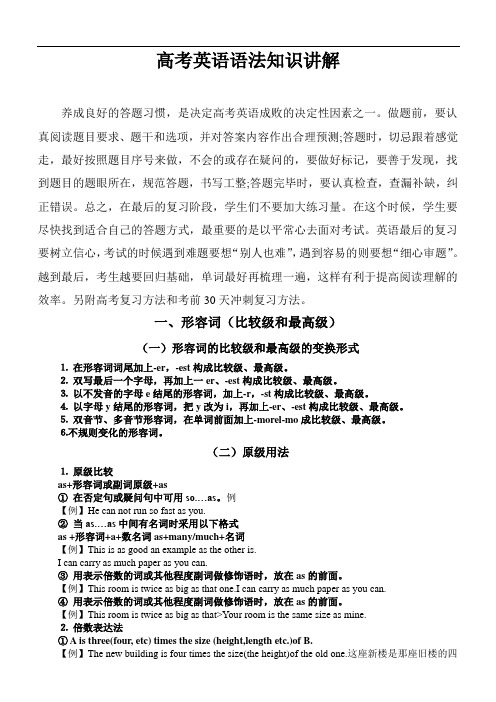
高考英语语法知识讲解养成良好的答题习惯,是决定高考英语成败的决定性因素之一。
做题前,要认真阅读题目要求、题干和选项,并对答案内容作出合理预测;答题时,切忌跟着感觉走,最好按照题目序号来做,不会的或存在疑问的,要做好标记,要善于发现,找到题目的题眼所在,规范答题,书写工整;答题完毕时,要认真检查,查漏补缺,纠正错误。
总之,在最后的复习阶段,学生们不要加大练习量。
在这个时候,学生要尽快找到适合自己的答题方式,最重要的是以平常心去面对考试。
英语最后的复习要树立信心,考试的时候遇到难题要想“别人也难”,遇到容易的则要想“细心审题”。
越到最后,考生越要回归基础,单词最好再梳理一遍,这样有利于提高阅读理解的效率。
另附高考复习方法和考前30天冲刺复习方法。
一、形容词(比较级和最高级)(一)形容词的比较级和最高级的变换形式⒈在形容词词尾加上-er,-est构成比较级、最高级。
⒉双写最后一个字母,再加上一er、-est构成比较级、最高级。
⒊以不发音的字母e结尾的形容词,加上-r,-st构成比较级、最高级。
⒋以字母y结尾的形容词,把y改为i,再加上-er、-est构成比较级、最高级。
⒌双音节、多音节形容词,在单词前面加上-morel-mo成比较级、最高级。
⒍不规则变化的形容词。
(二)原级用法⒈原级比较as+形容词或副词原级+as①在否定句或疑问句中可用so.…as。
例【例】He can not run so fast as you.②当as.…as中间有名词时采用以下格式as +形容词+a+数名词as+many/much+名词【例】This is as good an example as the other is.I can carry as much paper as you can.③用表示倍数的词或其他程度副词做修饰语时,放在as的前面。
【例】This room is twice as big as that one.I can carry as much paper as you can.④用表示倍数的词或其他程度副词做修饰语时,放在as的前面。
(完整版)高考英语语法知识点总结

专题一定语从句一、关系代词引导的定语从句1、that 指人或物在从句中作主语,宾语或表语which 指物在从句中作主语,宾语或表语(作宾语时可以省略)who 指人在从句中作主语,宾语或表语whom 指人在从句中作宾语whose 指人或物在从句中作定语as 指人或物在从句中作主语,宾语或表语but 指人或物在从句中作主语,宾语或表语注意:指物时,whose+名词=the+名词+of which 或 of which+the+名词2、as 的用法(1)常用于下列结构:such…as; so…as;the same…as; as…as注意:the same…as 表示同一类,不同一个the same…that 表示同一个(2)as与which的区别a、位置不同as可放在主句后,主句前或主句中间;which只能放在主句后。
b、as起连接作用,表达说话人的观点、看法,并指出主句内容的根据或出处,意为“正如,正像”.Which相当于并列句,可以用and this来代替,意为“这一点,这件事’"。
注意:as常用于下列结构:as we know/ as is known to all, as we all can see, as has been said before/above,as might be excepted, as is often the case, 一般不能用which代替as。
C、在从句中作主语时,which既可作系动词be的主语也可作实义动词的主语,而as只可作系动词be的主语。
3、but用作关系代词,相当于who/that…not例:In China there is no one but knows Lei Feng。
二、只用that不用which的情况1、。
先行词为 all , much, everything, nothing , something ,anything, nothing, none, the one 等不定代词时2、先行词被only, any, few, little, no , all, just , very ,right等修饰时。
高考英语语法归纳总结

高考英语语法归纳总结目录:第01章名词性从句第02章“It”用法及其句型和固定搭配讲解第03章高中英语语法中的省略现象第04章主谓一致第05章动词不定式第06章倒装结构第07章定语从句第08章被动语态第09章祈使句第10章感叹句第11章疑问句第12章名词第一章名词性从句在句子中起名词作用的句子叫名词性从句〔Noun Clauses〕. 名词性从句的功能相当于名词词组, 它在复合句中能担任主语、宾语、表语、同位语、介词宾语等,因此根据它在句中不同的语法功能,名词从句又可分别称为主语从句、宾语从句、表语从句和同位语从句.一.主语从句主语从句是在复合句中充当主语的从句,通常放在主句谓语动词之前或由形式主语it代替,而本身放在句子末尾.1. It 作形式主语和it引导强调句的比较It 作形式主语代替主语从句,主要是为了平衡句子结构,主语从句的连接词没有变化.而it引导的强调句则是对句子某一部分进行强调,无论强调的是什么成分,都可用连词that.被强调部分指人时也可用who/whom.例如:a〕 It is a pi ty that you didn’t go to see the film. 你不去看那场电影真可惜.b〕 It doesn’t interest me whether you succeed or not.我对你成功与否不感兴趣.c〕 It is in the morning that the murder took place. 谋杀案是在早上发生的.〔强调句型〕d〕 It is John that broke the window. 是John打碎的窗户.〔强调句型〕2. 用it 作形式主语的结构〔1〕 It is +名词+从句It is a fact that …事实是…It is an honor that …非常荣幸…是常识〔2〕 It is +形容词+从句It is natural that…很自然…It is strange that…奇怪的是…〔3〕 It is +不及物动词+从句It seems that…似乎…It happened that…碰巧…It appears that…似乎…〔4〕 It +过去分词+从句It is reported that…据报道…It has been proved that…已证实…It is said that…据说…3. 主语从句不可位于句首的五种情况:〔1〕if 引导的主语从句不可居于复合句句首.〔2〕It is said /reported…结构中的主语从句不可提前.例如:正确表达:It is said that President Jiang will visit our school next week.错误表达:That President Jiang will visit our school next week is said.〔3〕It happens/occurs…结构中的主语从句不可提前.例如:正确表达:It occurred to him that he failed in the examination.错误表达:That he failed in the examination occurred to him.〔4〕It doesn’t matter how/whether …结构中的主语从句不可提前.例如:正确表达:It doesn’t matter whether he is wrong or not.错误表达:Whether he is wrong or not doesn’t matter.〔5〕含主语从句的复合句是疑问句时,主语从句不可提前.例如:正确表达:Is it likely that it will rain in the evening?错误表达:Is that will rain in the evening likely?4. what 与that 在引导主语从句时的区别what 引导主语从句时在句时在从句中充当句子成分,如主语.宾语.表语,而that 则不然.例如: a〕 What you said yesterday is right.b〕 That she is still alive is a consolation二.宾语从句宾语从句就是在复合句中作宾语的名词性从句,通常放在主句谓语动词〔及物动词〕或介词之后.1. 作动词的宾语〔1〕由that引导的宾语从句〔that 通常可以省略〕, 例如:I heard that be joined the army. 我听说他参军了.〔2〕由what, whether 〔if〕引导的宾语从句,例如:a〕 She did not know what had happened. 她不知道发生了什么.b〕 I wonder whether you can change this note for me. 我想知道你是否能帮我改一下笔记.〔3〕动词+间接宾语+宾语从句.例如:She told me that she would accept my invitation.她对我说她会接受我的邀请.2. 作介词的宾语,例如:Our success depends upon how well we can cooperate with one another.我们的成功取决于我们之间的合作.3. 作形容词的宾语,例如:I am afraid 〔that〕 I’ve made a mistake.我恐怕我已经犯了一个错误.注意:that 引导的从句常跟在下列形容词后作宾语:anxious, aware, certain, confident, convinced, determined, glad, proud, surprised, worried, sorry, thankful, ashamed, disappointed, annoyed, pleased, hurt, satisfied, content 等.也可以将此类词后的that 从句的看作原因状语从句.4. it 可以作为形式宾语it 不仅可以作为形式主语,还可以作为形式宾语而真正的宾语that 从句则放在句尾,特别是在带复合宾语的句子中. 例如:We heard it that she would get married next month. 我听说她下个朋就会结婚了.5. 后边不能直接跟that 从句的动词这类动词有allow, refuse, let, like, cause, force, admire, condemn, celebrate, dislike, love, help, take, forgive 等.这类词后可以用不定式或动名词作宾语,但不可以用that引导的宾语从句.如:正确表达:I admire their winning the match.错误表达:I admire that they won the match.6. 不可用that从句作直接宾语的动词有些动词不可用于“动词+间接宾语+that从句“结构中,常见的有envy, order, accuse, refuse, impress, forgive, blame, denounce, advise, congratulate等.例如:正确表达:He impressed the manager as an honest man.错误表达:He impressed the manager that he was an honest man.7. 否定的转移若主句谓语动词为think, consider, suppose, believe, expect, fancy, guess, imagine等,其后的宾语从句若含有否定意义,一般要把否定词转移到主句谓语上,从句谓语用肯定式.例如:I don’t think this dress fits you well. 我认为这件衣服不适合你穿.三. 表语从句表语从句在复合句中作表语的名词性从句,放在系动词之后,一般结构是“主语+连系动词+表语从句”.可以接表语从句的连系动词有be, look, remain, seem等.引导表语从句的that常可省略.另外,常用的还有the reason is that…和It is because 等结构.例如:1〕 The question is whether we can make good preparation in such a short time.2〕 This is why we can’t get the support of the people.3〕 But the fact remains that we are behind the other classes.4〕 The reason he is late for school is that he missed the early bus.四. 同位语从句同位语从句就是在复合句中作名词的同位语的名词性从句.1. 同位语从句的功能同位语从句对于名词进一步解释,说明名词的具体内容,一般由that引导,例如:1〕 The king’s decision that the prisoner would be set free surprised all the people.2〕 The order that all the soldiers should stay still is given by the general.2. 同位语在句子中的位置同位语从句有时可以不紧跟在它所说明的名词后面,而是被别的词隔开.例如:He got the news from Mary that the sports meeting was put off.3. 同位语从句与定语从句的区别〔1〕定语从句中的that既代替先行词,同时以在从句中作某个成分〔主语或宾语〕,而同位语从句中的that是连词,只起连接主句与从句的作用,不充当句中任何成分.〔2〕定语从句是形容词性的,其功能是修饰先行词,对先行词加以限定,描述定的性质或特征;同位语从句是名词性的,其功能是对名词进行补充说明.例如:1〕The news that he told me is that Tom would go abroad next year.〔他告诉我的消息是汤姆明年将出国.〕〔第一个that引导的从句是定语从句,that在从句中作宾语〕2〕The news that Tom would go abroad is told by him.〔汤姆将出国的消息是他讲的.〕〔同位语从句,that在句中不作任何成分〕高一英语名词性从句专项练习1.____he does has nothing to do with me.A. whateverB. No matter whatC. ThatD. If2. The manager came over and asked the customer how____3. Energy is ____makes thing work..A. whatB. somethingC. anythingD. that4. Information has been put forward ____ more middle school graduates will be admitted into universities.A. whileB. thatC. whenD. as5. This is ___the Shenzhou V Spaceship landed.A. thereB. in whichC. whereD. when6. They have no idea at all____.A. where he has goneB. where did he goC. which place has he goneD. where has he gone7. The doctor did a lot to reduce th e patient’s fear ____he would die of the disease.A. thatB. whichC. of whichD. of that8. The order came ___the soldiers ____the small village the next morning.A. that ;had to leaveB. that; should leaveC. /; must leaveD. when; should leave9. ___is no possibility ____Bob can win the first prize in the match.A. There; thatB. It; thatC. there; whetherD. It; whether10. The question came up at the meeting_____ we had enough money for our research.A. thatB. whichC. whetherD. if11. Is _____he said really true?A. thatB. whatC. whyD. whether12.____the meeting should last two days or three days doesn’t matter.A. ThatB. WhetherC. IfD. Where13. It worried her a bit _____her hair was turning gray.A. whileB. ifC. thatD. for14. ???_____more countries can use natural energy in the future remains to be seen.A. WhetherB. ThisC. whoD. If15.____he will go to work in a mountain village surprises all of us.A. WhatB. ThatC. WhetherD. If16. ____you don’t like him is none of my business.A. WhatB. ThatC. WhoD. HowA. What; whatB. That; thatC. what; thatD. That ; what18. ____appeared to me that he enjoyed the food very much.A. WhatB. ItC. All thatD. That19. It is widely ______that smoking can cause cancer.A. believedB. thinkC. sayD. hopedA. WhatB. ThatC. HowD. WhereKeys:1—5 ABABC 6—10 AABAC 11—15 BBCAB 16—20 BCBAA第二章“It”用法及其句型和固定搭配讲解"It" 用法及其句型和固定搭配,是高中英语语法的重点、难点,又是近几年高考的热点,因此应给予充分的重视,现将it用法归纳如下:一、It用作实词表达以下概念:指代前文提到的事物,前文中的this, that;替代前文中的内容;指代一位性别不明的小孩或未知的人;指代未指明但谈话双方都知道的那件事;指代时间、天气、气候、距离等自然现象……二、It用作形式主语替代作主语的从句、动词不定式、动名词,而把真正作主语的从句、动词不定式、动名词置于句尾.It 作形式主语的常见句型:1. 代作主语的动词不定式,其句型为〔1〕 It be adj. 〔for sb.〕 to do sth.此处adj. 通常为描述事件的形容词:easy, difficult, hard, necessary, unnecessary, possible, impossible, likely, unlikely, right, wrong, important, unimportant, legal, illegal, well-mannered, ill-mannered, polite, impolite, clear, obvious, certain, suitable, proper, fit, useful, useless, dangerous…例 It is illegal 〔for a teenager〕 to drive a car without a license.〔2〕 It be adj. of sb. to do sth.此处adj. 通常为描述人的形容词:kind, unkind, nice, rude, cruel, considerate, thoughtful, thoughtless, careful, careless, silly, foolish, stupid, clever, wise, crazy.例 It's kind of you to help me with the problem.〔3〕 It替代作主语的动名词的常见句型It's no good/use doing…It's 〔well〕worth doing…It's 〔well〕worth one's while doing/to do…It's 〔well〕worth while doing/ to do例 It's no use crying over spilt milk.2. It替代作主语的从句常见句型〔1〕 It is + noun +从句例 It is no secret that the president wants to have a second term at office.〔2〕 It is adj. +clauseIt's surprising that… 〔should〕………竟然……It's a pity/shame that…〔should〕………竟然……例It's important that you should apologize to her for your rudeness.〔=It's of much importance that you should apologize to her for your rudeness.〕〔3〕 It verb sb. + clause= It is v-ing + clauseIt+surprise/delight/interest/disappoint/worry/disturb/annoy/amaze/bother/concern/frighten/please/anger sb. that…例 It worried me that she drove so fast.〔= It was worrying that she drove so fast.〕〔4〕 It verb 〔to sb.〕 that…= sb/sth verb to do例 It 〔so〕 happened/chanced that they were out.〔= They happened/chanced to be out.〕〔5〕 It is v-ed that…=sb/sth is to do〔verb=say, report, think, believe, hope, expect, agree, accept, decide, determine, intend, plan, understand, know〕例 It is said that the couple have gotten divorced.〔=The couple are said to have gotten divorced.〕〔6〕 It is v-ed that … 〔should〕…例 It is suggested that they should begin with the third question.三、It作主语的句型1. It takes sb. … to do…〔=sb takes…to do…〕某人用多长时间做某事例 It took the men a week to mend our roof.〔= The men took a week to mend our roof.〕2. It's 〔just〕〔un〕like sb. to do…〔不〕像某人做某事的风格例 It was 〔just〕 like him to think of helping us.3. It's 〔about/high〕 time that… should /v-ed…是该做某事的时候了例 It's〔about/high〕 time that we should take action.4. It's the x-th time 〔that〕 … have v-ed…第几次做某事了例 It's the third time that he has failed the driving test.5. It is/has been… since …continuous v-ed〔延续性动词〕某动作已有多长时间不发生了例 It's 10 years that he lived here6. It was〔not〕… before…过〔不〕了多长时间某动作发生了例 It was not long before they arrived.四、It 作形式宾语用来替代作宾语的从句、动词不定式、动名词,而把真正作宾语的从句、动词不定式、动名词置于句尾.It 作形式宾语的常见句型:1. verb+ it+ adj./noun 〔for/of〕 to do/clause 〔verb=think, believe, suppose, consider, feel, make, keep…〕例 I think it hard for you to do the task on your own./I think it hard that you'll do the task on your own.2. verb+it+adj./noun 〔one's〕 doing 〔adj.=useless/worth/worthwhile〕〔noun=no use/no good/worth one's while/a waste of time/money/energy/words〕〔verb=think, believe, suppose, consider, feel, make, keep…〕例 I'll make it worth your while telling me about his secret.3. verb+it+ important/unimportant/necessary/unnecessary/natural/essential that … 〔should〕…verb+it+of much/great/no/little importance that…〔should〕…〔verb=think, believe, suppose, consider, feel, make, keep…〕例 I think it important that you 〔should〕 attendthe conference.4. verb + it+ as+ noun/adj.+ clause 〔verb=accept, regard, take, see, view〕例 The lecturer takes it as encouraging when so many students attend his lecture.5. v. +it + prep. + that…owe it to sb. that…把…归功于…leave it to sb that…把…留给某人去做take it for granted that …想当然keep it in mind that…例 Don't bother to arrange anything. Just leave it to me to sort out.6. It用在不能直接跟宾语从句的动词后面,尤其是表示好恶的动词后,enjoy, like, love, dislike, resent, hate, don't mind, be fond of, feel like, see to 宾语从句紧跟it之后例 I hate it you can swim so well and I can't.7. It用在不能直接跟宾语从句的介词后面,宾语从句紧跟it之后〔except that例外〕例 I'm for it that you will follow their advice.五、强调句型It is/was+被强调部分+ that〔who〕… 强调句型用来强调谓语动词以外的任何句子成分.当被强调部分是人时也可以用who.在使用强调句型时需注意以下几点:1. 请注意强调句型的特殊疑问句例 When was it that he changed his mind to take part in the activity?2. 在强调原因状语从句时,只能强调由because所引导的从句例3. 在强调not … until结构时必须把not与until一起放到被强调的位置上例 It was not until she took off her dark glasses that I realized she was my brother.4. 注意强调句型与定语从句的区别例 It was at 7 o'clock that he came here yesterday.〔强调句型〕It was 7 o'clock when he came here yesterday.〔定语从句〕六、It 常用的固定搭配1. make it〔1〕.在口语当中相当于succeed,表示:成功、做到、说定、赶上、及时到达例 It's hard to make it to the top in show business.〔2〕.在口语中相当于fix the date for,表示“约定好时间”例—Shall we meet next week?—OK. We just make it next Saturday.2. as it is〔1〕.相当于in fact, in reality表示“事实上,实际情况是……”例 We had planed to finish the task today, but as it is we probably won't finish it until next week.〔2〕.相当于方式状语从句,表示“照原样”例 Leave the table as it is.3. as it were 相当于as one might say, that is to say, 表示“也就是说,可以说,换句话说”例 He is, as it were, a modern Sherlock Holmes.4. if it weren't for…/if it hadn't been for…用来引导虚拟语气,相当于without, or but for, 表示“如果不是……,要不是……”例 If it weren't for Tom, I wouldn't be alive today.5. that's it〔1〕. 相当于That's all. That's so much. 表示“至此为止,没有别的了”例 You can have one more sweet, and that's it.〔2〕. 相当于 That's right.表示“对啦”例— I guess the key to the problem is thechoice “A”—That's it.6. catch it 在口语中,相当于be punished/scolded for doing sth. wrong. 表示“因做错事而挨骂,受责备,受批评,受惩罚”例 We'll really catch it form our teacher if we're late for class again.7. have it〔1〕.相当于say, insist表示“说,主张,表明,硬说”例 Rumour has it that they are getting divorced.〔2〕.相当于get to know something,表示“了解,知道,获悉”例 I had it from John that she was going abroad.8. have what it takes在口语中,相当于be well qualified for, 表示“具有成功的条件”例 You can take it from me that your daughter has what it takes to be a star.9. so it seems / appears.10. Keep at it! 〔Don't give up!〕相当于go on,表示“继续做,不放弃”例 My teacher asked me to keep at it.11. Go it! 〔Go on!〕拼命干, 莽撞12. Now you have done it! 〔You have done sth. wrong.〕13. Now you'll catch it! 〔You'll be punished.〕14. As it happened, …在口语中,相当于it's a pity that…, 表示“真不凑巧,真遗憾”例 As it happened, they were out.15. As it turned out,…在口语中,相当于it was found to be in the end, 表示“最后被证明是”例 As it turned out, his statement was false.16. Such as it is〔they are〕在口语中,相当于although it may not be worth much, 表示“虽然没有多大价值”例 You can borrow my exam notebook, such as it is.17. Take it/things easy. 相当于Don't worry or don't hurry. 用来劝告别人,表示“不要慌,别担心,存住气”例 Take it easy! He will do it well.18. Take it from me.在口语中,相当于believe me what I say.表示“请相信我的话,我敢担保”例 You can take it from me that he will make it this time.19. For what it is worth…在口语中,相当于although I'm not sure it's of value, 表示“不管其价值如何”例 Here is the article I promise you, for what it's worth.20. Worth it 在口语中,相当于useful, 表示“有好处,值得做”例 Don't hesitate about it! It's worth it.21. Believe it or not.表示“信不信由你”例 Believe it or not, Tom is getting married to Mary next Sunday.22. Take it or leave it. v. 要么接受要么放弃例 That is my last offer. You can take it or leave it.23. It all depends/that all depends 在口语中,相当于it hasn't been decided yet, 表示“那得看情况,还没有定下来”例—Are you going to the countryside for holiday?—It/That all depends.24. It's up to sb. 在口语中,相当于it's decided by sb. 表示“由……决定,由……负责,取决于……”例—Shall we go out for dinner?—It's up to you.“It”用法及其句型和固定搭配专练1. Was it during the Second World War_____ he died?A.thatB.whileC.in whichD.then 〔88〕A.thisB.thatC.itD.he 〔89〕3. I don't think ____ possible to master a foreign language without much memory work.A.thisB.thatC.itsD.it 〔91〕4.Does ______ matter if he can't finish the job on time?A.thisB.thatC.heD.it 〔91〕5. It was not _____ she took off her glasses _____ I realized she was a famous film star.A.when , thatB.until , thatC.until , thatD.when , then 〔92〕6. I was disappointed with the film. I had expected ______ to be much better.A.thatB.thisC.oneD.it 〔93〕7. It was not until 1920 ______ regular radio broadcasts began.A.whileB.whichC.thatD.since 〔94〕8. ______is a fact that English is being accepted as an international language.A.ThereB.ThisC.ThatD.It 〔95〕9. It was only when I reread this poems recently _____ I began to appreciate their beauty.A.untilB.thatC.thenD.so 〔97〕10. I hate_____when people talk with their mouths full.A.itB.thatC.theseD.them 〔98〕A.oneB.thatC.whatD.it 〔2000〕12.I like ___ in the autumn when the weather is clear and bright. 〔2004〕A. thisB. thatC. itD. one13. —Do you like ___ here?—Oh, yes. The air, the weather, the way of life. Everything is so nice.〔全国卷〕A. thisB. TheseC. ThatD. it14. We needed a new cupboard for the kitchen. So Peter made ___ from some wood. 〔全国卷〕A. itB. OneC. HimselfD. another15. The foreign Minister said, " _____ our hope that the two sides will work towards peace."〔2004北京〕A. This isB. There isC. That isD. It is16. _____ is reported in the newspaper, talks between the two countries are making progress. 〔2004北京〕A. ItB. AsC. ThatD. What17. — How often do you eat out?〔2004, 天津〕— ________, but usually once a week.A. Have no ideaB. It dependsC. As usualD. Generally speaking18. We wanted to get home before dark, but it didn't quite _____ as planed. 〔2004浙江卷〕19. — What do you want to do next? We have half an hour until the basketball game.—________. Whatever you want to do is fine with me.A. It just dependsB. It's up to youC. All rightD. Glad to hear that20. It was ____ back home after the experiment.A. not until midnight did he goB. until midnight that he didn't goC. not until midnight that he wentD. until midnight when he didn't goKEYS:1-5 ACDDB 6-10 DCDBA 11-15 ACDBD 16-20 BBBBC第三章高中英语语法中的省略现象在英语语言中,为了使语言简洁明了,重点突出或上下文紧密相连,可以省去某些句子成分而保持句子愿意不变,这种语言现象称之为省略.现就英语中的种种省略现象分析如下:一、并列复合句中的省略在并列句中后边的分句可以省略与前边分句中相同的成分.如:a〕The boy picked up a coin in the road and 〔the boy 〕handed it to a policeman. 这个男孩在马路上拾起一枚硬币并把他交给了警察.b〕 Your advice made me happy but〔your advice made〕 Tom angry .你的建议使我高兴但使汤姆生气.c〕Tom must have been playing basketball and Mary 〔must have been〕doing her homework. 汤姆肯定一直在打篮球,玛丽一直在写作业.d〕Gao Xiumin was born in 1959 and Fu Biao 〔was born〕in 1963.高秀敏出生于1959年,傅彪出生于1963年.二、主从复合句中的省略1.状语从句中的省略一般说来省略现象多出现在下列五种状语从句中:由 when ,while ,as ,before, after , till, until, once等引导的时间状语从句;由whether ,if , unless 等引导的条件状语从句;由though , although ,even if ,whatever等引导的让步状语从句;由 as ,than 等引导的比较状语从句;由as, as if , as though 等引导的方式状语从句.上述状语从句在省略时应遵循下面原则:1〕当状语从句的主语与主句的主语一致时,可以省略状语从句的主语和系动词be,这时从句中可出现如下结构:〔1〕连词〔as, as if , once〕+ 名词; 〔2〕连词〔though, whether , when〕+形容词;〔3〕连词〔whether, as if ,while 〕+介词短语;〔4〕连词〔when , while , though 〕+ 现在分词;〔5〕连词〔when ,if ,even if ,unless ,once ,until, than , as 〕+ 过去分词;〔6〕连词〔as if ,as though 〕+ 不定式.如:.庞龙曾经是个工人,现在变成一位著名的歌手.b〕 Work hard when 〔you are〕 young ,or you'll regret.趁年轻要努力学习,要不然你会后悔的.c〕 He looked everywhere as if 〔he was〕in search of something .他到处看似乎在找什么东西.d〕 While 〔he was〕 holding talks with President Hu Jintao ,US President George W. Bush thanked China for itsimportant role in the Six-Party Talks.美国总统布什在与胡锦涛主席会谈时,感谢中国在六方会谈中起的重要作用.e〕 The exhibition is more interesting than 〔it was〕 expected .这次展览比被预料的有趣的多.f〕Olympic gold medallist hurdler Liu Xiang opened his lips as if 〔he were〕to speak.奥林匹克金牌获得者跨栏运动员刘翔张开嘴好像要说什么.注意:1〕当从句的主语和主句的宾语一致时,间或也有这样的省略,如:Her father told her to be careful when 〔she was〕crossing the street.当她过马路时父亲告诉她要当心.2〕当从句的主语是 it,谓语动词中又含有系动词be 时,可以把it和系动词be一起省略.此时构成连词〔if , unless ,when , whenever〕+形容词的结构.如:Unless 〔it is〕 necessary ,you'd better not refer to the dictionary.如果没有必要,你最好不要查字典.2.定语从句中的省略1〕一般说来,在限制性定语从句中,作宾语的关系代词 that ,which , whom 可以省略;如:Is this reason 〔that〕he explained at the meeting for his carelessness in his work?这就是他在会上解释他工作中粗心的原因吗?〔2002上海春季〕而在非限制性定语从句中作宾语的关系代词 which , whom 不可以省略.试比较:Tom 〔whom〕 you saw yesterday fell ill.〔 whom可以省〕你昨天见到的汤姆病倒了.Tom , whom you saw yesterday ,fell ill. 〔 whom不可以省〕汤姆病倒了,你昨天见到他了.2〕在口语和非正式用语中,关系副词when ,where , 和 why 经常用that 来代替,甚至还可省略.如:a〕 This is the first time 〔when/that〕he had trouble with the boss.这是他第一次麻烦老板.b〕He wants to find a good place 〔where/that〕we can have a picnic during the “golden week ”holiday .他想找一个能在黄金周期间野餐的好地方.c〕 Could you tell us the reason 〔why/that〕he was so unhappy ? 你能告诉我们他为什么如此不高兴吗?3〕当先行词为表示方式的the way 时,从句不能用how 来引导,应该用that 或in which ,或将它们全部省略.如:I don't like the way 〔that/in which〕 you laugh at her.我不喜欢你嘲笑他的行为.3.宾语从句中的省略1〕在及物动词后面所接的宾语从句中,连词that一般可以省略;但如果及物动词后面是由that引导的两个或两个以上的并列的宾语从句,那么只有第一个t hat可以省略.如:a〕I think 〔that〕the reform of the renminbi's exchange rate is necessary.我认为人民币兑换率的改革是必要的.b〕He said 〔that〕the Anti-secession law had been passed and that President Hu Jintao had signed a presidential order 他说《反分裂国家法》已被通过,而且胡锦涛主席已签署了主席令.2〕由 which , when ,where , how,和 why 引导的宾语从句,可以全部或部分省略.如:n’.我知道NBA明星要到我们城市来但我不知道他什么时候来.b〕He wants to move abroad but his parents wonders why 〔he wants to move abroad〕他想搬迁到国外但他的父母想知道为什么.4.在与suggest ,request ,order ,advise 等词相关的名词性从句中,须用虚拟语气形式“should +动词原形”,should可以省略.如:Chirac, President of the Republic of France suggested that the China-France Culture Year 〔should〕 last long in various forms.法国总统希拉克建议中法文化年以各种各样的形式长期持续.5.主句省略多用于句首.如:〔It is a 〕 Pity that I didn’t go to Mary's birthday party yesterday.很遗憾,我昨天没有去参加玛丽的生日聚会.6.在答语中,主句可全部省略.如:—Why were you absent from school last Friday ?—〔I was absent from school〕Because my mother was ill. —上周五你为什么没有上学?—因为我妈妈病了.三、简单句中的省略1.省略主语1〕祈使句中的主语通常被省略如:〔You〕 Open the door, please. 请开一下门.2〕其它省略主语多限于现成的说法如:a〕〔I〕 Thank you for your help 谢谢你的帮助.b〕〔It〕Doesn’t matter.没关系.2.省略主谓语或主谓语的一部分如:a〕〔There is〕 No smoking. 禁止抽烟b〕〔Is there〕anything else ? 还有其他事吗?.请这边走.d〕〔Will you〕 Have a smoke ? 抽烟吗?3.省略宾语如:—Do you know Mr. Li ? 你认识李先生吗?—I don’t kn ow 〔him.〕我不认识他4.省略表语如:—Are you thirsty ? 你30岁了吗?Yes , I am 〔thirsty〕. 是的,我是.5.同时省略几个成分如:a〕—Are you feeling better now? 你觉得好些了吗?—〔I am feeling 〕 Much better 〔now〕好多了.b〕〔I wish〕 Good luck 〔to you〕 .祝你好运/祝你顺利.四、动词不定式省略,只保留to 的场合1.不定式作某些动词的宾语时,这些动词常见的有:love, like, care, wish, hope, expect, prefer, refuse, mean , try , oblige , advise , persuade , agree , want , afford , forget , remember , try , manage等.如:a〕— You should have thanked her before you left . —I meant to ,but when I was leavin g I couldn’t find her anywhere.—你本该在离开前谢谢她.—我本打算这么做,但当我就要离开的时候我却找不到她了.〔2000上海春〕b〕 You can do it this way if you like to .如果你想做,你可以这么做.2.不定式作某些动词的宾语补足语或主语补足语时,这些动词常见的有:ask , tell ,advise, force, persuade, wish, allow, permit , forbid ,expect, order ,warn 等.如:a〕The boy wanted to ride his bicycle in the street ,but his mother told him not to. 男孩想在街上骑他的自行车,但他母亲不让.〔NMET1995〕n’.她想来,可是她父母不让.3.不定式在句中作某些形容词的状语时,常见的形容词有:happy, glad ,eager , anxious , willing , ready 等.如:— I will be away on a business trip .Could you mind looking after my cat ? — Not at all.I would be happy to 〔look after your cat〕. —我要出差,你能帮我照顾一下我的猫吗?—没关系,我很愿意.4.不定式作某些复合谓语时,常见结构如:be able to, be going to, have to, ought to, used to等.如:He doesn’t like fish but he used to 他现在不喜欢吃鱼,但过去喜欢.五、动词不定式to 的省略1.主语部分有to do ,系动词 is 或 was 时,作表语的不定式通常省去to.如:The only thing you have to do is press the button.你必须做的惟一事情是按按钮.2.作介词but ,expect ,besides 的宾语,前面又有实意动词 do时,不定式通常省去to. 如:He said that Chen Shuibian had nothing to do except push a pro-“independence” timetable.他说陈水扁除了推进支持“独立”的时间表外,什么也没有做.3.主语部分暗含to do,表语中的不定式通常省去to.如:All I want 〔to do〕 is go to school and study hard .我想要〔做〕的就是上学,努力学习.4.当两个或多个不定式并列时,其后的不定式符号可以省略,但有对比关系时不可省略.如:It is easier to say than to do . 说起来容易,做起来难.5.在would rather…than…等结构中,不定式符号常常要省略. 如:I would rather stay at home than go to see a film.我宁愿呆在家也不愿去看电影.6.在see ,watch ,notice ,hear, listen to ,look at ,feel ,have, make, let ,observe 等词后作宾语补足语时省略不定式符号to;why 〔not〕 do 结构中, 不定式不带to.如:a〕 I saw her enter the room. 我看见她进入了房间b〕 Why not join us ?为什么不加入到我们的行列里来呢?。
高考英语语法知识点归纳总结完整版
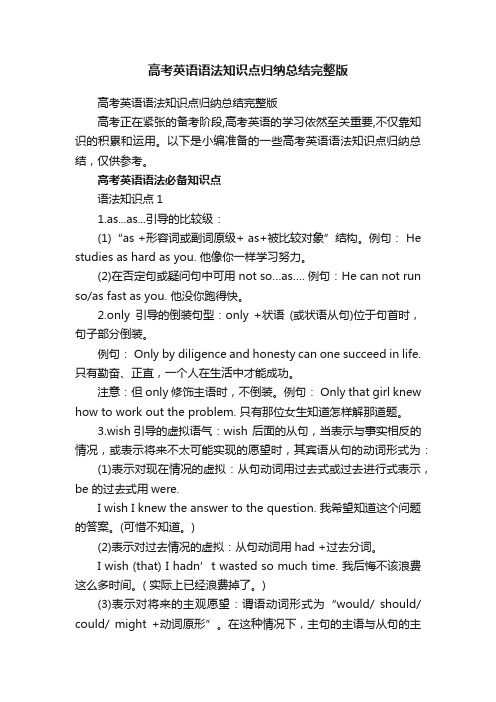
高考英语语法知识点归纳总结完整版高考英语语法知识点归纳总结完整版高考正在紧张的备考阶段,高考英语的学习依然至关重要,不仅靠知识的积累和运用。
以下是小编准备的一些高考英语语法知识点归纳总结,仅供参考。
高考英语语法必备知识点语法知识点11.as...as...引导的比较级:(1)“as +形容词或副词原级+ as+被比较对象”结构。
例句: He studies as hard as you. 他像你一样学习努力。
(2)在否定句或疑问句中可用not so…as…. 例句:He can not run so/as fast as you. 他没你跑得快。
2.only引导的倒装句型:only +状语(或状语从句)位于句首时,句子部分倒装。
例句: Only by diligence and honesty can one succeed in life. 只有勤奋、正直,一个人在生活中才能成功。
注意:但 only修饰主语时,不倒装。
例句: Only that girl knew how to work out the problem. 只有那位女生知道怎样解那道题。
3.wish引导的虚拟语气:wish 后面的从句,当表示与事实相反的情况,或表示将来不太可能实现的愿望时,其宾语从句的动词形式为:(1)表示对现在情况的虚拟:从句动词用过去式或过去进行式表示,be 的过去式用were.I wish I knew the answer to the question. 我希望知道这个问题的答案。
(可惜不知道。
)(2)表示对过去情况的虚拟:从句动词用had +过去分词。
I wish (that) I hadn’t wasted so much time. 我后悔不该浪费这么多时间。
( 实际上已经浪费掉了。
)(3)表示对将来的主观愿望:谓语动词形式为“would/ should/ could/ might +动词原形”。
高考英语语法句子类型及句子成分基础知识点
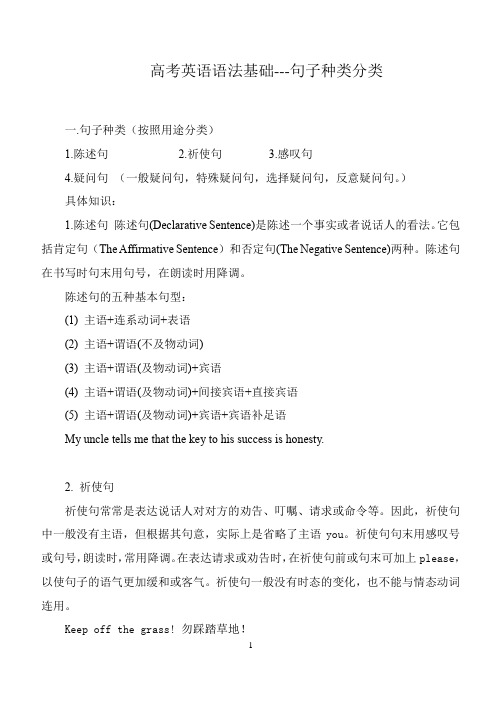
高考英语语法基础---句子种类分类一.句子种类(按照用途分类)1.陈述句2.祈使句3.感叹句4.疑问句(一般疑问句,特殊疑问句,选择疑问句,反意疑问句。
)具体知识:1.陈述句陈述句(Declarative Sentence)是陈述一个事实或者说话人的看法。
它包括肯定句(The Affirmative Sentence)和否定句(The Negative Sentence)两种。
陈述句在书写时句末用句号,在朗读时用降调。
陈述句的五种基本句型:(1) 主语+连系动词+表语(2) 主语+谓语(不及物动词)(3) 主语+谓语(及物动词)+宾语(4) 主语+谓语(及物动词)+间接宾语+直接宾语(5) 主语+谓语(及物动词)+宾语+宾语补足语My uncle tells me that the key to his success is honesty.2. 祈使句祈使句常常是表达说话人对对方的劝告、叮嘱、请求或命令等。
因此,祈使句中一般没有主语,但根据其句意,实际上是省略了主语you。
祈使句句末用感叹号或句号,朗读时,常用降调。
在表达请求或劝告时,在祈使句前或句末可加上please,以使句子的语气更加缓和或客气。
祈使句一般没有时态的变化,也不能与情态动词连用。
Keep off the grass! 勿踩踏草地!Always keep in mind that your main task is to get this company running smoothly.3. 感叹句感叹句的基本构成形式1).What(+a/an)+形容词+名词+主语+谓语!2).How+形容词+a/an+可数名词单数+主语+谓语!3).How+形容词/副词+主语+谓语!You can't imagine how crucial a role the pigeons played in the battlefields.你无法想象在过去的战场山鸽子发挥了多么重要的作用。
高考英语重点语法总结归纳
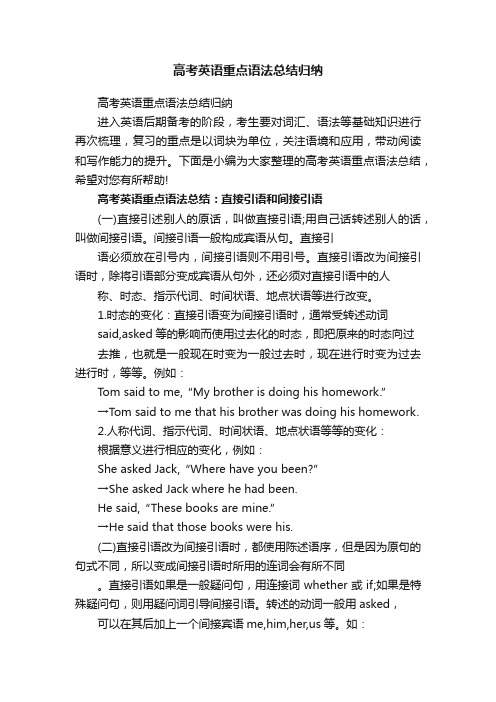
高考英语重点语法总结归纳高考英语重点语法总结归纳进入英语后期备考的阶段,考生要对词汇、语法等基础知识进行再次梳理,复习的重点是以词块为单位,关注语境和应用,带动阅读和写作能力的提升。
下面是小编为大家整理的高考英语重点语法总结,希望对您有所帮助!高考英语重点语法总结:直接引语和间接引语(一)直接引述别人的原话,叫做直接引语;用自己话转述别人的话,叫做间接引语。
间接引语一般构成宾语从句。
直接引语必须放在引号内,间接引语则不用引号。
直接引语改为间接引语时,除将引语部分变成宾语从句外,还必须对直接引语中的人称、时态、指示代词、时间状语、地点状语等进行改变。
1.时态的变化:直接引语变为间接引语时,通常受转述动词said,asked等的影响而使用过去化的时态,即把原来的时态向过去推,也就是一般现在时变为一般过去时,现在进行时变为过去进行时,等等。
例如:Tom said to me,“My brother is doing his homework.”→Tom said to me that his brother was doing his homework.2.人称代词、指示代词、时间状语、地点状语等等的变化:根据意义进行相应的变化,例如:She asked Jack,“Where have you been?”→She asked Jack where he had been.He said,“These books are mine.”→He said that those books were his.(二)直接引语改为间接引语时,都使用陈述语序,但是因为原句的句式不同,所以变成间接引语时所用的连词会有所不同。
直接引语如果是一般疑问句,用连接词whether或if;如果是特殊疑问句,则用疑问词引导间接引语。
转述的动词一般用asked,可以在其后加上一个间接宾语me,him,her,us等。
如:She said,“Is your father at home?”→She asked me if/whether my father was at home.“What do you do every Sunday?”My friend asked me.→My friend asked me what I did every Sunday.直接引语如果是祈使句,改为间接引语时,要将祈使句的动词原形变为带to的不定式,并在不定式的前面根据原句的语气( 即请求或命令)加上ask,tell,order等动词,如果祈使句为否定式,则在不定式前加not。
高考英语高频语法
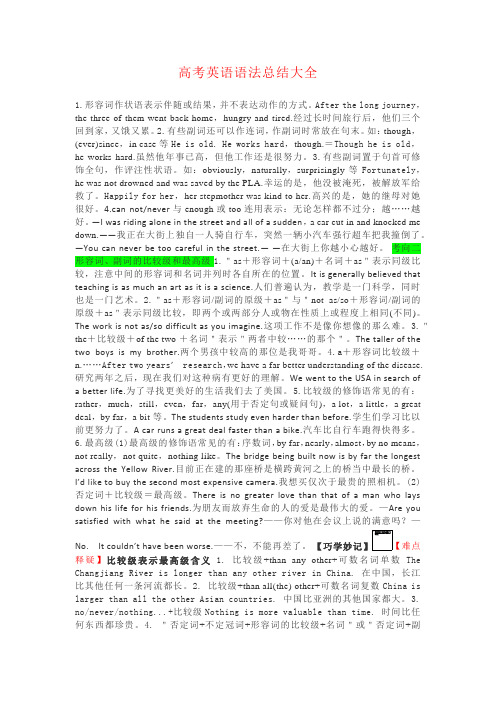
高考英语语法总结大全1.形容词作状语表示伴随或结果,并不表达动作的方式。
After the long journey,the three of them went back home,hungry and tired.经过长时间旅行后,他们三个回到家,又饿又累。
2.有些副词还可以作连词,作副词时常放在句末。
如:though,(ever)since,in case等He is old. He works hard,though.=Though he is old,he works hard.虽然他年事已高,但他工作还是很努力。
3.有些副词置于句首可修饰全句,作评注性状语。
如:obviously,naturally,surprisingly等Fortunately,he was not drowned and was saved by the PLA.幸运的是,他没被淹死,被解放军给救了。
Happily for her,her stepmother was kind to her.高兴的是,她的继母对她很好。
4.can not/never 与enough 或too连用表示:无论怎样都不过分;越……越好。
—I was riding alone in the street and all of a sudden,a car cut in and knocked me down.——我正在大街上独自一人骑自行车,突然一辆小汽车强行超车把我撞倒了。
—You can never be too careful in the street.——在大街上你越小心越好。
考向二形容词、副词的比较级和最高级1."as+形容词+(a/an)+名词+as"表示同级比较,注意中间的形容词和名词并列时各自所在的位置。
It is generally believed that teaching is as much an art as it is a science.人们普遍认为,教学是一门科学,同时也是一门艺术。
高中英语新高考-语法:专题(基础篇)——连系动词,否定陈述,省略,倒装,强调句
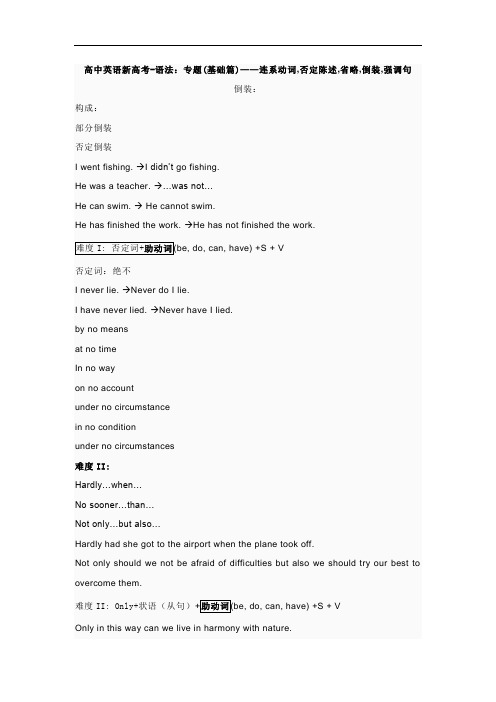
Only because was he busy he did not come to attend your birthday party. (×)Only because he was busy did he not come to attend your birthday party. (√)Only he can finish the job.难度III:So + adj. +be +S+…So+ adv. +助动词(do, can, have) +S + VSo thought-provoking is the picture that it should awaken us to the problem.So clearly does he speak English that he can always make himself understood. (×) 难度III: However +adj./adv. +S + V,However is he late, Mother will wait for him to have dinner together. (×)However late he is, Mother will wait for him to have dinner together. (√)难度IV:Adj./Adv./N. +though/as+S V, SVOHeavily though/as it rained, many of us overcame the difficulty and came attending the lecture.Child as he is, he knows a lot about computer. (×)Not until…I di dn’t go to bed until he came home.Not until he came home did I go to bed.全倒装SVO OVS难度I: 1)方向类的副词Hurry up, Tom. Here comes the bus.In he came hurriedly, telling us that the enemies were coming toward the village. (×)难度II介词短语+V(be, lie, stand, exist)+S, 修饰In the picture stands a girl, who ran to her mother happily when…In the north of the city stands a beautiful school, which enjoys the distinction of smartest students and teachers.—My husband never washes the dishes.—So is mine. (×)—Neither / Nor does mine. (√)强调难度I: It is/was +被强调的部分+that…n./pron.II: 介词短语/状语从句It was not until he came that I finished my work.It was on Monday that I picked up a purse.III. 特殊疑问:Wh- is/was it that…I wonder wh- it is/was that…IV. 省略---Hi, Tom, do you have any idea when Sundance Festival came into being?---Oh, yes, I do. It was in 1978 when China just began its economic reform (that Sundance…)连系动词打怪级别:I (★★)●连系动词是用来连接句子主语和表示该主语所处状态的成分的动词。
高中英语精华浓缩语法(附高中英语词汇表)

高中英语精华浓缩语法分册(第四版)第一章定语从句1.1定语从句(一)1.1.1关系代词:which、who、that、whoseThis is a shop that/which sells personal computers.The watch that/which I bought yesterday works well.An architect is a person who/that designs houses and buildings.The player who/that I beat in the table tennis game was a seed player.On the hill were maple trees whose leaves had turned red.(I had a meeting whose purpose was completely unclear.I had a meeting the purpose of which was completely unclear.I had a meeting of which the purpose was completely unclear.)The hero whose left leg he lost in the war is well looked after.1.1.2关系副词:where、when、whyI still remember the day when we first met.The city where I was born is on the new railway line.This is the reason why he left the company.1.1.3介词+关系代词=关系副词句中的when = on which where = in which why = for which1.1.4关系代词与关系副词的区别:I like to take my vocation in the mountain which is quiet and beautiful.I like to take my vocation in the mountain where(in which)there are many plants.We will never forget the day which we spent together.We will never forget the day when(on which)we worked.That is the reason which he gave us for his action.That is the reason why (for which) he did that thing.1.1.5介词提前The man with whom you shook hands just now is head of our department.The room in which my family live used to be a garage.Last night I had a dream in which I became a Nobel Prize winner.The palace to which I often pay a visit was built in the 17th century.The teacher in whose class my daughter is studying is a kindhearted man.1.1.6 限定与非限定的区别:A.This is a shop that sells personal computers.Shakespeare,whose plays are popular,was a great writer.Football,which is a very interesting game, is played all over the world.B.The cab drivers who knew about the traffic jam took another road.The cab drivers,who knew about the traffic jam,took another road.C.The wine which was in the cellar was all ruined.The wine,which was in the cellar, was all ruined.1.1.7The teachers speak highly of the workbooks,all of which have come out.The audience,most of whom were college students, enjoyed the concert.These books,two of which I have read,are interesting.1.1.8School will break up on July 1,by which time we will have got our school reports.He may be late,in which case we ought to wait for him.He lost his temper,at which point I decided to go home.They bribed the officials,which practice was very common there.He believes in students’ doing more homework,which idea I am quite opposed to.1.1.9He is a teacher,as/which is clear from his manner.As we know,water resources are very limited on the earth.(as was expected/as is natural)She has married again,as was expected.She has married again,which was unexpected.Most devices of the integrated circuit,as are manufactured, are ruggedlypacked.(名词短语或句子)The meeting,which was held in the park,was a success.(可以单个名词)He was late for school,as/which was usual with him.He saw the girl,as/which he had hoped(he would).He saw the girl,which delighted him.Bamboo is hollow,which makes it very light.David is tall,as are my brothers.David works hard,as do my brothers.1.1.10先行词被形容词最高级、序数词、the only、the last、the same、the very、any、all等所修饰This is the best film that has ever been made.The first place that we visited was the Great Wall.The only furniture that he had in the room was a bed and a small desk.all the words that I've learnedThose were the very words that he said at the meeting.all、anything、nothing、little、much等不定代词That is all that I want to say.Is there anything that I can do for you?There’s still much that is to be done.人与物的名词词组They talked of persons and things that they remembered in the school.1.1.1 1What’s that which he refused to accept?That which was bitter to endure may be sweet to remember.曾经艰辛回味甜。
高考英语语法必考点与常考点归纳
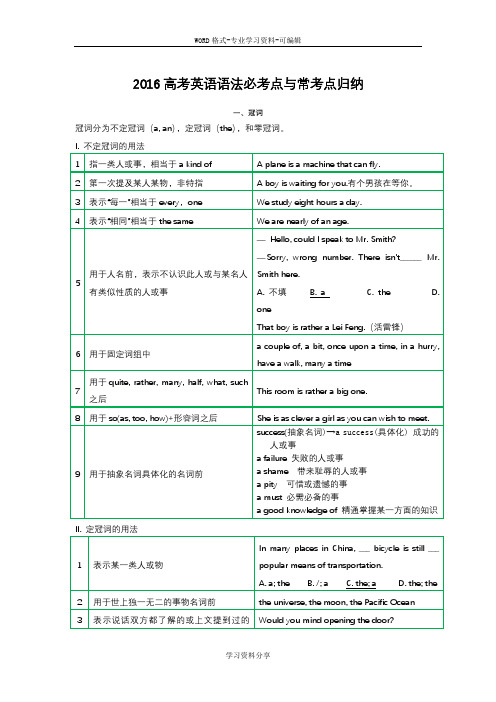
2016高考英语语法必考点与常考点归纳一、冠词冠词分为不定冠词(a, an),定冠词(the),和零冠词。
二、名词和主谓一致特别注意:名词类别的相互转换抽象名词与个体名词的转换规则名词的复数形式:名词的复数形式,一般在单数形式后面加-s或-es(参看有关语法书)。
英语里有些名词的复数形式是不规则的,请看下表三、代词四、形容词和副词I. 形容词注意:多个形容词修饰同一个名词的顺序熟记口诀就可以顺利解题:限定描绘大长高,形状年龄和新老,颜色国籍跟材料,作用类别往后靠。
规则:限定语(The、A)+ 描绘性形容词+ size(小)+ shape(形状)+ age(年龄、时间)+ color(颜色)+ origin(国籍、来源)+ material(材料)+ purpose(目的)+ 名词。
▲This ________ girl is Linda’s cousin. (05北京卷)A. pretty little SpanishB. Spanish little prettyC. Spanish pretty littleD. little pretty Spanish3.形容词(短语)作伴随状语As he looked at the goat, it rolled over, dead. 当他看着山羊的时候,山羊翻了个身,死了。
Afraid of difficulties, they prefer to take the easy road.由于害怕困难,他们宁愿走好走的路。
形容词和副词的比较等级分为原级,比较级和最高级。
比较级和最高级的构成一般是在形容any, a great deal ;2.表示“最高程度“的形容词没有最高级和比较级。
如:favourite, excellent, extreme, perfect ,superior,junior 等。
五、动词和短语动词六、动词的时态和语态注:现在分词、不定式、过去分词都可以作独立成分generally speaking一般说来;frankly speaking坦白地说;judging from/by...根据……来判断;considering.../taking...into consideration考虑到……;to tell you the truth说实话;seeing...考虑到……;supposing假设,如果;providing如果;given考虑到,鉴于;provided that如果常见的非谓语动词形式1.To do 表示将要发生的动作2.To be done 表示将要发上的被动动作3.To have done 表示已经完成的动作4.To have been done 表示已经完成的被动动作5.To be doing 表示正在发生的动作6.Doing 表主动进行7.Being done 表示正在发生的被动动作8.Having done 表示done这个分词的动作发生在主句谓语动词之前9.Having been done 表示been done 这个被动动作发生在主句谓语动词之前10.V-ed过去分词表被动完成在解非谓语习题时同学们遇到最大的困难有两个:一是如何判别是谓语动词还是非谓语动词;二是如何选用哪一种非谓语动词及其恰当的形式。
新课标高考英语重点语法范例归总十三类(背诵版)

新课标高考英语重点语法范例第一周派生词在新课标全国卷的语法填空题中,有涉及单词的形式变化的题目。
此外,新考纲要求考生掌握3 000多个英语单词。
因此,掌握常用派生词的构词方法不仅能帮助同学们做好语法填空题,还能帮助同学们扩大词汇量,为同学们在高考中稳操胜券奠定基础。
一、名词后缀1.动词+ion/tion /sion→名词(表示动作或动作过程)correct v.改正;纠正correction n.改正celebrate v.庆祝celebration n.庆祝;庆祝会conclude v.完成;结束conclusion n.结论;结束2.动词+er/or→名词(表示从事某种职业或进行某种活动的人)drive v.驾驶开车;驱赶driver n.司机;驾驶员gather v.聚集;采集gatherer n.收集者;采集者conduct v.指挥;管理conductor n.指挥;售票员3.动词+ment→名词punish v.惩罚punishment n.惩罚4.动词/形容词+th→名词warm adj.温暖的warmth n.温暖grow v.生长growth n.生长5.形容词+y→名词difficult adj.困难的difficulty n.困难honest adj.诚实的honesty n.诚实6.形容词+ness→名词kind adj.善良的kindness n.善良7.动词+ance→名词annoy vt.使烦恼annoyance n.生气;烦恼8.ship结尾的名词(表示身份;关系;资格)member n.成员;会员membership n.会员资格professor n.教授professorship n.教授身份9.ing结尾的名词garden n.花园gardening n.园艺greet v.打招呼;问候greetings n.问候[针对训练]语篇填空(用所给单词的适当形式完成下列短文)AFrom the 1.expression (express) on Mary’s face, he knew he left a bad 2.impression (impress) on her and if she won the 3.election (elect) to become chairman of the Environment anization (organize), he could not get her 5.permission(permit) to join it although he was willing to do his bit to rid the world of 6.pollution (pollute) and to help people enjoy a better earth.When he was wondering how to change this embarrassing situation, he got 7.inspiration (inspire) from his wife’s words.Yes, he should try his best to win the election and become chairman himself with his 8.determination (determine) to work for the organization.“My dear, you are really a wonderful 9.helper (help)!I’m sure I will be the 10.winner (win) of the election.” He said to his wife excitedly.BIt was really a hard time when Li Ping first came to the United States.His 1.earnings (earn) could hardly cover the expenses, so when his wife gave 2.birth (bear) to their second daughter, they could not afford enough nutrition food.Soon, poor nutrition caused the 3.death (die) of the poor baby.4.Loneliness (lonely) was another problem because they had no 5.relations (relate) or friends there.Thanks to his 6.bravery (brave) and 7.perseverance (persevere), he managed to gain the 8.citizenship (citizen) of the United States and in the end he had his permanent 9. settlement (settle).He always tells his children like this: Perseverance leads to 10.happiness (happy) and success.二、形容词后缀1.常见形容词后缀(1)名词+al→形容词(表示“有……属性”,“与……有关”)agriculture n.农业agricultural adj.农业的(2)动词+ive→形容词decide v.决定;下决心decisive adj.决定性的;关键的(3)动词+able→形容词(表示“能够”,“适于”,“值得”)change v.变化;兑换changeable adj.易变的;变化无常的(4)名词+ful→形容词care n.小心;关心careful adj.小心的;仔细的(5)名词+less→形容词(意思与原名词相反)care n. 小心;关心careless adj.粗心的(6)名词+ly→形容词friend n.朋友friendly adj.友好的(7)名词+y→形容词dirt n.污物;脏物dirty adj.脏的(8)名词+ous→形容词danger n.危险dangerous adj.危险的2.复合形容词的构成(1)形容词+ing分词easygoing 随和的(2)形容词+名词+ed kindhearted 善良的;好心的(3)名词+ed分词watercovered 被水覆盖的(4)副词+ed分词wellwritten 写得好的(5)数词+名词+ed threelegged 三条腿的[针对训练]Ⅰ.阅读下列句子,写出画线单词的意思1.It feels like an unbelievable stroke of luck —of fate, really.(2012·四川高考阅读C)( )2.The good working condition in this city is attractive.( )3.You can rely on him because he is reliable.( )4.Her words struck fear into her heart so that she was sleepless all night long, afraid of being killed unexpectedly some day.( ) 5.It was a frosty cold morning when he set off for the remote village.( )答案:1.不可思议的;难以置信的 2.吸引人的 3.可依赖的;靠得住的 4.没有睡觉的;不眠的 5.有霜的Ⅱ.语篇填空A:用所给单词的适当形式完成下列短文Lucy likes talking and everybody says she is municative (communicate).She is 2.active (act) in answering the teachers’ questions and from time to time her classmates find her answers quite 3.impressive (impress) and 4.acceptable (accept). Of course, not every student likes her, but she has many friends who think Lucy is a 5.creative (create) and 6.helpful (help) girl.For example, she once led a 7. homeless (home) child to her home and made the child her younger sister.Besides, she spent 8.countless (count) hours caring for a sick neighbor until she was well again.She is 9.friendly (friend) to those who have difficulty with their subjects.All in all, Lucy is the most 10.famous (fame) girl in her school.B:运用所学构词知识完成下列短文Our journey was farreaching amongst snowcovered/capped (雪封的) mountains where no Englishspeaking (说英语的) people live.The local people are goodlooking (相貌好看的), easygoing (随和的) andhardworking (勤劳的).Our hostess was oldaged (年老的),white haired (白发苍苍的) andsunburnt (被太阳晒伤的).She gave me home made (自家做的) yaks milk cake, looking selfsatisfied (自足的) as I enjoyed this rare treat although very wellknown (著名) and wide spread (广泛流传) around here.I was exhausted when I fell into the ready made (准备好了的) bed she prepared for me.三、动词词缀1.前缀en+形容词→动词enrich v.丰富enlarge v.变大;增大;扩大2.形容词+en→动词shorten v.缩短widen v.加宽3.fy结尾的动词simplify v.简化classify v.归类4.ize结尾的动词realize v.认识到popularize v.普及[针对训练]Ⅰ.阅读下列句子,写出画线部分的意思1.Extracurricular activities enable the students to know how to apply the knowledge learned in the textbooks.( )2.The two countries are trying their best to normalize_their_relationship.( )3.Some think that studying abroad can broaden_their_horizons.( )4.You will horrify the baby if you speak too loudly.( ) 答案:1.使能够 2.使关系正常化 3.拓宽视野 4.使惊惧Ⅱ.用所给单词的适当形式填空1.Try your best to memorize (memory) these new words.2.The question must be simplified (simple) so that we can find out a solution to it.3.It costs a lot of money if we plan to purify (pure) the waste water.4.He quickened (quick) his steps to arrive home earlier.5.You can enlarge (large) your vocabulary if you keep on memorizing some new words every day.四、否定词缀1.表示否定意义的前缀un不,非unable不能够unlucky 不幸的dis不,非dishonest不诚实的discontinuous 不连贯的in不,非inactive不活跃的incorrect 不正确的im不,非impatient不耐烦的impossible不可能的ir不,非irregular 不规则的irresponsible不负责任的il不,非illogical 不合逻辑的illegal 非法的non不,非nonexistent不存在的nonstop 直达的;连续不断的mis错误mislead 误导misunderstand 误解dis+动词(意义相反) dislike不喜欢disagree 不同意un+动词(意义相反) uncover 揭开undress 脱衣服2.表示否定意义的后缀名词+less→否定意义的形容词use n. 用处;用途useless adj.无用的hope n. 希望hopeless adj.没有希望的;绝望的home n.家homeless adj.无家可归的[针对训练]Ⅰ.阅读下列短文,写出画线单词的意思A 1.misconception was that the high temperature caused the big fire.However, Miss Wang knew it was not the true story.So she insisted that the government should make the truth known to the public.When Miss Wang knew that her appeal was 2.disallowed,_ she felt rather 3.disappointed.She decided to 4.disclose the truth: it was human errors that were to blame for the terrible disaster.She wanted to tell the public about the coldness of some officials.She believed that the truth must be 5.uncovered now.1.____________ 2.____________ 3.____________4.____________ 5.____________答案:1.错误观念 2.驳回;不准许 3.失望的;沮丧的4.揭露 5.揭露;揭发Ⅱ.语篇填空(用所给单词的适当形式完成下列短文)The speech seemed to be 1.nonstop (stop) and the listeners became very2.impatient_ (patient).When the speaker said that oil was3.nonrenewable (renew) and that the best way to solve the problem was not to make cars and buses to force people to go to work or school on foot, the audience thought it was4.impractical_ (practice) and5.unbearable_ (bear) to listen to him any longer.They6.disbelieved_ (believe) that the world would go smoothly without these modern transportations.They also thought that the speaker was7.irresponsible (responsible) to make such a statement without thinking it carefully and his speech would cause some8.misunderstandings (understand).So most of the listeners chose to leave, shouting loudly and angrily.五、正确使用派生词1.动词、介词、冠词、物主代词等词类后一般接名词或动名词。
2023届高考英语重点语法总结讲义

高中英语重点语法总结➢名词性从句➢定语从句➢状语从句➢主谓一致➢倒装➢省略➢被动语态第一章.名词性从句在句子中起名词作用的句子叫名词性从句(Noun Clauses)。
名词性从句的功能相当于名词词组,在复合句中能作主语、宾语、表语、同位语、介词宾语等成分。
因此,根据在句中不同的语法功能名词性从句又可分别称为主语从句、宾语从句、表语从句和同谓语从句。
一.主语从句主语从句是在复合句中充当主语的从句,通常放在主句谓语动词之前或由形式主语it代替,而本身放在句子末尾。
That引导的主语从句时,在从句中不作任何成分,也没有实际意义,一般情况下that不可省略。
(1)that引导的主语从句置于句首That the moon travels around the earth once every month is known to everyone.That prices for fruit will go up is certain.(2)形式主语it 代替主语从句和it 引导的强调句比较It代替主语从句的作用就是为了平衡句子结构,主语从句的连词没有发生变化。
而it 引导的强调句则是对句子某一部分进行强调,无论强调的是什么成分,都可用连词that。
被强调部分指人时也可用who/whom。
例如:It is a pity that you didn’t go to see the film.It doesn’t interest me whether you succeed or not.It is John that broke the window(强调句型)It is in the morning that the murder took place.(强调句型)2.用it作形式主语的结构(1)It is+名词+从句It is a fact that…事实是…It is an honor that……非常荣幸(2)It is+形容词+从句It is natural that…很自然…It is strange that…奇怪的是…(3)It is+不及物动词+从句It seems that…似乎…It happened that…碰巧…It appears that…似乎…(4)It is+过去分词+从句It is reported that…据报道…It is said that…据说…Whether引导的主语从句可置于句首,if不引导主语从句Whether he can finish his task on time is of great importance. 他是否能按时完成任务非常重要。
高考英语必考语法大全(简约版)
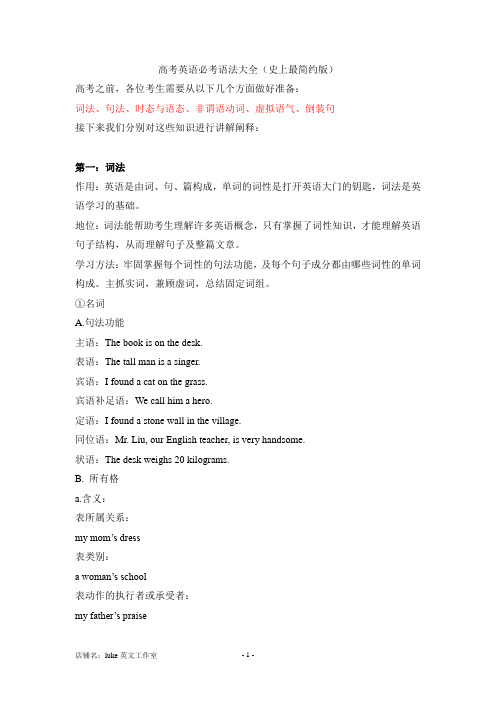
高考英语必考语法大全(史上最简约版)高考之前,各位考生需要从以下几个方面做好准备:词法、句法、时态与语态、非谓语动词、虚拟语气、倒装句接下来我们分别对这些知识进行讲解阐释:第一:词法作用:英语是由词、句、篇构成,单词的词性是打开英语大门的钥匙,词法是英语学习的基础。
地位:词法能帮助考生理解许多英语概念,只有掌握了词性知识,才能理解英语句子结构,从而理解句子及整篇文章。
学习方法:牢固掌握每个词性的句法功能,及每个句子成分都由哪些词性的单词构成。
主抓实词,兼顾虚词,总结固定词组。
①名词A.句法功能主语:The book is on the desk.表语:The tall man is a singer.宾语:I found a cat on the grass.宾语补足语:We call him a hero.定语:I found a stone wall in the village.同位语:Mr. Liu, our English teacher, is very handsome.状语:The desk weighs 20 kilograms.B. 所有格a.含义:表所属关系:my mom‟s dress表类别:a woman‟s school表动作的执行者或承受者:my father‟s praiseb.分类…s所有格表有生命的my father‟s carof所有格表无生命的the cover of the book双重所有格表部分概念或某种感情a friend of my sister‟s②冠词不定冠词:a, an 表泛指,每一,类别,抽象名词具体化定冠词: the 表特指的人或物零冠词:表许多特殊含义和特殊用法③代词A人称代词主格:I you he she it we you they宾格:me you him her it us you themB 物主代词形容词性:my you‟re his her its our you‟re their名词性:mine yours his hers its ours yours theirsC 反身代词单数myself yourself himself herself itself复数ourselves yourselves themselvesD 相互代词each other one another each other‟s one another‟sE 指示代词this that these those such sameF 疑问代词who whom whose which whatG 连接代词who whom which what that whose whoever whomever whateverwhichever等H 关系代词who whom whose which that asI 不定代词注意:1. –body和-one同义2. –thing有两个意思:东西和事情3. some 有两个意思:一些和某一some book some books4. 不定代词的定语要后置J it的用法A用作代词a. 代上文提到的同一物b. 代上文的指示代词c. 代天气、时间、距离、环境等d. 代不清楚的一个人e. 代整个句子B. 形式主语It‟s important for you to learn English well.C. 形式宾语Our boss made it clear that he would go abroad next month.D. 强调句型It is/was +主/宾/状+that/who +其余成分④数词A. 年月日时刻及年代表达法a.基本顺序是月、日、年b. 具体时刻用atc. 具体某一天用on举例:at 3:40 on Sep 1st, 2009 in Aug, 2004 in the 1980‟sB. 分数构成:基数词/序数词分子大于1时,分母用复数a half a quarter five and four sixths注意:本身没有单复数,根据它所代替的名词而决定C.百分数构成:基数词+percent注意:本身没有单复数,根据它所代替的名词而决定。
高中英语高考复习基础语法考点整理(共七方面)
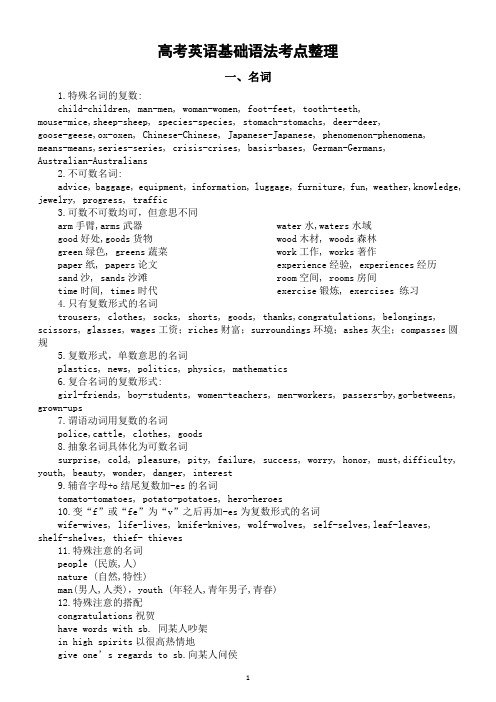
高考英语基础语法考点整理一、名词1.特殊名词的复数:child-children, man-men, woman-women, foot-feet, tooth-teeth,mouse-mice,sheep-sheep, species-species, stomach-stomachs, deer-deer,goose-geese,ox-oxen, Chinese-Chinese, Japanese-Japanese, phenomenon-phenomena,means-means,series-series, crisis-crises, basis-bases, German-Germans,Australian-Australians2.不可数名词:advice, baggage, equipment, information, luggage, furniture, fun, weather,knowledge, jewelry, progress, traffic3.可数不可数均可,但意思不同arm手臂,arms武器good好处,goods货物green绿色, greens蔬菜paper纸, papers论文sand沙, sands沙滩time时间, times时代water水,waters水域wood木材, woods森林work工作, works著作experience经验, experiences经历room空间, rooms房间exercise锻炼, exercises 练习4.只有复数形式的名词trousers, clothes, socks, shorts, goods, thanks,congratulations, belongings, scissors, glasses, wages工资;riches财富;surroundings环境;ashes灰尘;compasses圆规5.复数形式,单数意思的名词plastics, news, politics, physics, mathematics6.复合名词的复数形式:girl-friends, boy-students, women-teachers, men-workers, passers-by,go-betweens, grown-ups7.谓语动词用复数的名词police,cattle, clothes, goods8.抽象名词具体化为可数名词surprise, cold, pleasure, pity, failure, success, worry, honor, must,difficulty, youth, beauty, wonder, danger, interest9.辅音字母+o结尾复数加-es的名词tomato-tomatoes, potato-potatoes, hero-heroes10.变“f”或“fe”为“v”之后再加-es为复数形式的名词wife-wives, life-lives, knife-knives, wolf-wolves, self-selves,leaf-leaves,shelf-shelves, thief- thieves11.特殊注意的名词people (民族,人)nature (自然,特性)man(男人,人类),youth (年轻人,青年男子,青春)12.特殊注意的搭配congratulations祝贺have words with sb. 同某人吵架in high spirits以很高热情地give one’s regards to sb.向某人问侯in rags衣衫破烂It is good manners to do sth.有礼貌做某事二、动词时态和语态1.常考动词时态(1)三个一般:一般现在时、一般过去式、一般将来时;(2)三个现在:现在进行时、现在完成时、现在完成进行时;(3)三个过去:过去进行时、过去完成时,过去完成进行时。
高三英语语法基础知识大全

高三英语语法基础知识大全## Comprehensive English Grammar Basics for High School Seniors.Tenses.Present simple: expresses habitual actions, general truths, and current states of being.Present continuous: describes actions in progress or temporary situations.Present perfect: indicates actions or events that began in the past and have continued until now.Present perfect continuous: emphasizes the duration or ongoing nature of an action that started in the past and continues into the present.Past simple: refers to completed actions or events inthe past.Past continuous: describes actions or states that were ongoing at a specific time in the past.Past perfect: indicates actions or events that were completed before a certain point in the past.Past perfect continuous: focuses on actions or states that had been ongoing for a period of time before aspecific point in the past.Future simple: predicts actions or events that will occur at a specific time or after a certain period.Future continuous: emphasizes the ongoing nature of actions or events that will be in progress at a specific time in the future.Future perfect: indicates actions or events that will have been completed before a certain point in the future.Future perfect continuous: highlights the duration or ongoing nature of actions or events that will have started in the past and will continue into the future.Conditionals.Zero conditional: expresses general truths or facts.First conditional: describes probable or possible actions or events.Second conditional: indicates unlikely or hypothetical actions or events.Third conditional: refers to regrets or hypothetical situations in the past.Modals.Can: ability, permission, or possibility.Could: possibility, permission, or suggestion.May: possibility, permission, or request.Might: slight possibility or uncertainty.Must: necessity, obligation, or deduction.Should: advice, obligation, or expectation.Would: habits, preferences, or polite requests.Nouns.Common nouns: refer to general objects, places, or ideas.Proper nouns: name specific people, places, or things.Countable nouns: can be counted in singular or plural forms (e.g., book, books).Uncountable nouns: cannot be counted and are typicallysingular (e.g., water, money).Collective nouns: refer to groups or collections of things (e.g., team, audience).Articles."A" and "an" are used before singular countable nouns."The" is used before specific or known singular or plural nouns.Articles are not used before uncountable nouns or plural nouns that refer to general categories.Pronouns.Personal pronouns (I, me, you, etc.) replace the names of people or things.Possessive pronouns (my, mine, your, etc.) show ownership or possession.Demonstrative pronouns (this, that, these, those) point out specific objects or people.Indefinite pronouns (some, any, everyone, etc.) refer to non-specific people or things.Adjectives.Descriptive adjectives describe qualities or characteristics.Comparative adjectives compare two things or groups.Superlative adjectives compare three or more things or groups.Adverbs.Time adverbs indicate when something happens.Place adverbs tell where something happens.Manner adverbs describe how something is done.Frequency adverbs indicate how often something happens.Conjunctions.Coordinating conjunctions (and, but, or, etc.) connect two or more words, phrases, or clauses of equal importance.Subordinating conjunctions (because, although, since, etc.) introduce dependent clauses that provide additional information or explain the main clause.Prepositions.Prepositions (of, to, for, etc.) connect nouns or pronouns to other words in a sentence to show various relationships, such as location, time, or purpose.## 中文回答:时态。
英语_高考英语语法精讲教程_162页

最新版名校学习资料集锦全国各大名校资料集合第一主题高中英语语法系统全解(一)第一章动词时态(一)在英语中,不同时间发生的动作或存在的状态,要用不同的动词形式来表示,这就叫做动词的时态。
一、一般时一般时包括一般现在时、一般过去时、一般将来时和一般过去将来时。
A.一般现在时1.一般现在时的构成一般现在时主要用动词原形来表示。
主语是第三人称单数时,动词后面要加-s或-es。
They want good jobs.他们想要好的工作。
The coat matches the dress.外衣和裙子很相配。
This work does not satisfy me.这项工作我不满意。
Do you understand?你懂了吗?2.一般现在时的用法①一般现在时的基本用法a. 表示现在习惯性的动作或存在状态He always takes a walk after supper.晚饭后他总是散散步。
Everyone is in high spirits now.现在大家都情绪高涨。
b. 表示客观事实或普遍真理The sun rises in the east and sets in the west.太阳从东方升起在西方落下。
Sound travels faster through water than it does through air.声音在水中的传播速度要比在空气中快。
Time and tide wait for no man.时间不等人。
c. 表示主语的特征、能力和状态This cloth feels soft.这布摸上去很软。
I love classical music.我喜欢古典音乐。
The President still seems able to find time to go fishing.看来总统仍能有时间去钓鱼。
d. 表示按计划或安排将要发生的动作The meeting begins at 7:00.会议七点钟开始。
- 1、下载文档前请自行甄别文档内容的完整性,平台不提供额外的编辑、内容补充、找答案等附加服务。
- 2、"仅部分预览"的文档,不可在线预览部分如存在完整性等问题,可反馈申请退款(可完整预览的文档不适用该条件!)。
- 3、如文档侵犯您的权益,请联系客服反馈,我们会尽快为您处理(人工客服工作时间:9:00-18:30)。
高考英语基础语法浓缩版1. 名词(1)名词的可数与不可数可数名词指表示的人或事物可以用数来计量,它有单数与复数两种形式。
不可数名词指所表示的事物不能用数来计量。
物质名词与抽象名词一般无法用数目,来统计,都成为不可数名词。
不可数名词前一般不能用冠词a、an来表示数量,没有复数形式。
要表示“一个……”这一概念,就须加a piece of这一类短语。
要注意许多名词在汉语里看来是可数名词,在英语里却不可数。
如:chalk,paper,bread,rice,grass,news等。
(2)名词复数的规则变化A.一般情况下加-s。
B.以s, x, ch, sh, 结尾的加-esC.以辅音字母加y结尾的改y为i再加-esD.以f,fe结尾的,去掉f或fe,变成v再加-es(3)名词的所有格A. 单数名词词尾加’s,复数名词词尾若没有s,也要加’s。
如:the worker's bike,the Children’ s ballB. 表示几个人共有一样东西,只需在最后一个人的名字后加’ s若表示各自所有,则需在各个名字后' s。
如:This is Lucy and Licy' s room.These are Kate's and jack' s rooms.C. 如果是通过在词尾加—s构成的复数形式的名词,只加’。
如:the students' books,the girls' blouses(另外:名词+of+名词名词是有生命的,我们就用’s结构来表示所有关系。
如果名词所表示的事物是无生命的,我们就要用名词+of+名词的结构来表示所有关系。
) 2. 代词人称代词,物主代词,反身代词,指示代词,不定代词(1)人称代词第一人称单数I me my mine myself复数 we us our ours ourselves第二人称单数 you you your yours yourself复数 you you your yours yourselves第三人称单数 he him his his himselfshe her her hers herselfit it its its itself复数 they them their theirs themselves(2)物主代词物主代词的用法:形容词性物主代词后面一定要跟上一个名词;名词性物主代词可作主语、表语、宾语。
(3)反身代词反身代词的构成分两种:第一、二人称反身代词在形容词性物主代词后加上self或selves,第三人称的反身代词在宾格代词后加上self或selves.反身代词的用法:一种是作宾语,由主语发出的动作又回到动作者本身。
如:I enjoyed myself at the party. 另一种是作名词或代词的同位语;用来加强语气。
如:I can do it myself.(4)指示代词指示代词的特殊用法:(1)为了避免重复,可用that,those代替前面提到过的名词,但是this,these不可以。
(2)this,that有时可代替句子或句子中的一部分。
(5)不定代词one, some, any, other, another, all, both, each, neither, many, much等3. 冠词(1)不定冠词an用在元音读音开头(不是指元音字母)的词前,其余用不定冠词a. (2)定冠词的基本用法A. 用在重新提到的人或事物前面。
B. 指谈话双方都知道的人或事物前面。
C. 用在单数可数名词前面,表示某一类人或事物。
(3)定冠词的特殊用法A. 用在世界上独一无二的事物或方位名词前。
B. 用在序数词、形容词的最高级及only所修饰的名词前。
C. 用在江河、海洋、山脉、湖泊、群岛的名称前面。
D. 用在由普通名词和另外一些词所构成的专有名词前面。
E. 用在姓氏的复数形式前面,表示全家人或这一姓的夫妇二人。
F. 用在乐器名称前。
G. 和某些形容词连用,表示某一类人或事物。
(4)名词前不用冠词的情况A. 在专有名词 (包括人名、地名、节日、月份、季节) 、物质名词和抽象名词前—般不用冠词。
但在以Festival组成的民间节日前要加the。
B. 表示一类人或事物的复数名词前。
C. 名词前有物主代词、指示代词、不定代词或名词所有格修饰时,不用冠词。
D. 三餐饭、球类、棋类、游戏名称前一般不用冠词。
正在有些词组中,有无冠词含义不同。
(sit) at table就餐; sit at the table坐在桌边go to school去上学;go to the school去那所学校;in hospital住院;in the hospital在那个医院里4. 数词(1)数字的表示三位数数词要在百位和十位(若无十位则和个位)之间加and。
1,000以上的数字,从后向前第三位数加一个“,”,第一个“,”前为thousand,第二个“,”前为million,第三个“,”前为billion。
(2)序数词除了first,second,third外,其余都在基数词尾加-th构成。
(3)分数分子在前,分母在后,分子用基数词,分母用序数词,当分子大于1小时,分母序数词要变成复数。
(4)hundreds(thousands,millions)of……5. 形容词、副词(1)形容词的位置A. 形容词作定语一般要放在名词前面,但当形容词修饰不定代词something,nothing,anything时要放在所修饰的不定代词之后。
如:something important,nothing serious。
B. 当形容词带有表示度量的词或词组作定语或表语时,定语或表语要后置。
如:We have dug a hole two meters deep.The hole is about two meters deep.(2)形容词的比较等级单音节词和少数双音节词,在词尾加—(e)r,—(e)st来构成比较级和最高级。
其他双音节词和多音节词,在前面加more,most来构成比较级和最高级。
如:popular———more popular———most popularimportant—more important—most important(3)副词的比较等级单音节副词和个别双音节副词通过加-er,-est来构成比较级和最高级。
绝大多数副词借助more,most来构成比较级和最高级。
(4)少数形容词和副词比较级/最高级的不规则变化:原级比较级最高级well ——better ——bestbadly —— worse ——worstmuch ——more ——mostlittle —— less ——leastfar ——farther ——farthestfarthest furthestlate —— later ——latest(5)副词的最高级前面可以不加定冠词the。
6. 介词(1)表示时间的介词及介词短语in, at, on, before,after,till,since,for, from to, until, by,in the middle of,at the beginning of, at the end of,at half past five,at night,in a week,in the morning,in class,at sunrise, in spring/summer/autumn/winter,on Sunday,on Saturday afternoon,on a winter evening,for a long time,fortwo months,after school,since liberation,before lunch,at the time of,at the age of(2)表示地点的介词及介词短语in,at,into,to,on,beside,before,behind,above,under,outside, inside, up, from, far, from, near, across, off, down, among, past,between,out of,around,in the front of, in the middle of, at the back of,at the foot of,at home,at the gate,at the table,in the sky, on the ground,in a tree,in the south,in the sun,in the bed,on one's way home,by the side of1. 一般现在时概念: 表示经常发生的动作或经常存在的状态。
常和 always , often , usually , sometimes , every day 等表时间的状语连用。
如:1) I go to school every day . 我每天都去学校。
(表经常)2) He is always like that . 他总是那样。
(表状态)构成:1) 主语 + be (am / are / is ) +……2) 主语 + 实义动词/三单动词 + …2.一般过去时概念: 1) 表示过去某个时间发生的动作或存在的状态.常和表示过去的时间状语连用. 如: yesterday , last week , in 1998 , two days ago等.如: I went to a movie yesterday. 我昨天去看了一场电影.2) 也可表示过去经常或反复发生的动作.如: He always went to work by bike last week.构成: 1) 主语 + be (was / were ) +……2) 主语 + 实义动词过去式 +3. 现在进行时概念: 表示现在(说话瞬间)正在进行或发生的动作.如: He is singing.They are watching TV now.构成: 主语 + 助动词be(am/are/is) + 动词-ing形式构成.4. 过去进行时概念: 表示过去某一时刻或某一段时间正在进行的动作. 这一特定的过去时间除了有上下文暗示外,一般用时间状语来表示.如: 1) ---What were you doing?---I was jumping.2) ---What was the boy doing when the UFO arrived?---He was sleeping.构成: 主语 + 助动词be(was/were) + 动词-ing形式构成.5. 一般将来时概念: 表示将来某个时间要发生的动作或存在的状态,也表示将来经常或反复发生的动作,常与表示将来的时间状语连用,如: tomorrow, next week, next year, in the future等.如: He will go shopping tomorrow.They are going to play basketball next week.构成: 1) 主语 + 助动词will + 动原 +…2) 主语 + be going to + 动原 + ….6. 过去将来时概念: 表示在过去将来的某一时间发生的动作或存在的状态.构成: 1) 主语(第一人称) + 助动词should + 动原 +…2) 主语 + would + 动原 + ….3) 主语 + was/ were going to +动原…用法: 过去将来时除了上下文暗示外,一般常用在间接引语中,主句谓语动词为过去时态.如: 1) I should go.2) You knew I would come.3) They were going to Naning.7. 现在完成时构成: 主语 + 助动词 ( have / has ) + 动词过去分词 +…用法例句表示过去发生或已经完成的动作对现在造成的影响或结果. ---Have you had your lunch yet?---Yes, I have. (现在我不饿了)8. 过去完成时构成: 主语 + 助动词 had + 动词过去分词 +…用法例句表示过去在过去某一时间或动作之前已经发生或完成了的动作.它表示的动作发生的时间是”过去的过去”.表示过去某一时间可用by, before 等构成的短语,也可用when, before, 等引导的从句或者通过上下文表示.I had finished my homework when my mom came back home.从句的共同特点从句是指在一个句子中充当一个成分的句子,充当什么成分就叫什么从句,如:充当宾语就叫宾语从句,充当定语成分就叫定语从句。
